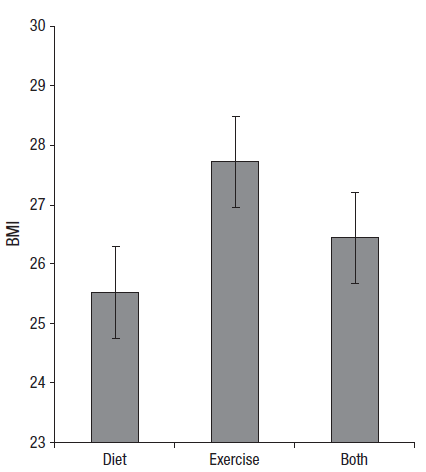A First Step to Weight Loss
To change your body, you must first change your mind. — Anonymous
Ironically, weight loss and weight maintenance are two of people’s most commonly held goals, yet nearly one third of all U.S. adults are overweight—a trend that has only been climbing since before the 90’s.
So why is it so difficult? What are the psychological factors preventing us from living healthier, fitter lives? Unfortunately, large scale problems like these don’t have simple solutions. But un-unfortunately, I do have a simple first step that you can adopt for yourself or spread to others in trying to attain your desired weight goals.
WHERE’S THE WEIGHT COME FROM?

But research does suggest there is one factor that accounts for more than the rest:
Food consumption.
To cite an editorial from the Journal of the American Medical Association:
“Environmental causes for obesity are far more influential than genes… [and although] exercise is associated with weight loss, its duration or intensity has minor effects on weight loss relative to diet” (Livingston & Zylke, 2012; p., 971-2)
In fact, if you compare today’s obesity rates with those in 1980, today’s rates–globally–are more than double! Yet, there hasn’t been enough time for genetic mutations to account for the obesity gains. And exercising rates have either increased or remained stagnant. So, what has changed, though?
Well for one, people eat approximately 200 more calories a day now than they did back then.
IT BEGINS WITH THE BELIEF

But even more interestingly, those who listed exercise as the primary cause (vs. diet or both combined), tended to be the most overweight themselves (see the graph).

Indeed, the researchers found this effect over and over again. In the U.S., France, South Korea, Hong Kong, the more people believed that weight gain was predominantly affected by exercise (vs. diet), the more unhealthy their weight tended to be.
To explain why this would be occurring, researchers brought participants into the lab and had them read a “scientific article” claiming that either diet or exercise was more influential on weight gain. Afterward, the researchers had participants complete some unrelated tasks, but importantly, they left the participants with a few chocolates to snack on.
For those who were led to believe exercise (vs. diet) was more important, on average, these participants ended up eating more chocolates. In other words, for those who believe exercise is more important, they tend to consume more food. They tend to think that diet isn’t as important for their health and that they can burn it off with exercise (which most people don’t).
YOU ARE WHAT BELIEFS YOU EAT

Nonetheless, understanding the factors that influence our goal attainment—and some of the psychology that stands in the way—is an important part of living a healthier, happier life. So, what other goals could you use a little psychological insight on? I want to make this site and its information as valuable to you as it can be!
Health-Consciously,
jdt
Everyday Psychology: One of the primary reasons that people tend to believe that diet and/or exercise are the main causes of obesity is because people tend to believe that weight gain is within a person’s control. And because of this, there can be a lot of stigma surrounding obesity (i.e., because people think these are “controllable” aspects of one’s life, they blame the overweight person for being overweight). However, once a person gets into a certain lifestyle, it can take more than a simple “change in one’s belief” to correct the issue. To that effect, try being compassionate toward others to help them keep to their consumption goals (or getting a friend to help you with your own). And as another tip, try using the psychological power of if-then statements as I’ve described previously on this site.
McFerran, B., & Mukhopadhyay, A. (2013). Lay theories of obesity predict actual body mass. Psychological science, 24(8), 1428-1436.







